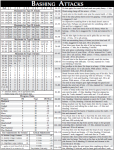JiffyPopTart
Bree-Yark
Personally, despite how much I enjoy elements of 5E, it is a step backwards in many ways. Other game systems have better mechanics, albeit not as simplistic. I get that was part of the appeal of 5E was to keep it simple, so I can accept that and still have some fun playing. I won't go into it here since it would derail this thread and take me more time than it's worth since it isn't as though the designers will listen or read this and make any of the changes.
This statement here is getting to the nugget of the actual reason you started this thread. The topic you want to discuss isn't "5e Proficiency Bonuses", it's actually "5e is too simplified for my tastes". That's a totally valid discussion topic and, while some might challenge your opinion, you could probably find people weighing in on all sides of the topic.
If you yearn to play a more realistic game you aren't in some boat out by yourself. There are lots of people like you. But that realistic game is not going to be 5e, because that's not what its striving for. At one time during the playtests the design team mentioned releasing different optional "rules modules" to accommodate groups that like things such as more tactical combat but it seems like thats not going to be happening and they have instead focused mainly on adventures and settings. Maybe someday it will happen, and maybe even then its not going to be realistic enough for some.
I'm 45 years old. I have a house that leaks when it rains (which it is now), a kid that's college age and driving me crazy, and a job that can grind me down because there is no one higher than me to hand of sticky issues to. When I head to DnD night I want to chill out, laugh with my buddies, and throw some dice. I don't find a situation like "The giant crab has you grappled and the only way you are going to escape is to roll a 20 because of game math" to be fun in any way. I don't find "I rolled a 2 so I fell face first when I tried to hop the 2 foot wide creek" funny. I just want to take part in a fun story that I will remember in the future. I can have fun succeeding, but only if it was a challenge. I can have fun failing, but only if I had a chance to win. Either extreme (You can never win/You can never fail) has no drama. Drama is what makes the game fun.
Making a game more realistic might be more up your alley (20th level characters are essentially indestructible to CR1 monsters) or more up your alley in a different way (any hit you take could be your last, even if you just tripped on the ice). Both of those games exist and are out there, so figure out the one that most floats your boat, buy it, and offer to run it when your game group isn't playing 5e.
In the late 80s/early 90s there was sort of an arms race to have "The Most Realistic" game, and the craziest one of those I ever "Played" (made a character and did one combat) was Rolemaster. I did a quick search and found this chart. This is the Rolemaster "Bashing Attacks" combat reference chart. I think you would agree that there is some point of diminishing returns on trying to make everything realistic. Its just that 5e skews "simple" from the median of that bell curve and you are probably looking for something on the other side.




